#social standing
Explore tagged Tumblr posts
Text
By: John Barry
Published: Sep 6, 2023
Do you ever hear a new concept, and suddenly realise that it has tapped into an important truth that had already been floating around on the hinterlands of your consciousness for some time? Well, 2019 saw the birth of one such idea: the concept of luxury beliefs (explained below), which was launched in the New York Post by Dr Rob Henderson, a former student of Yale and recent PhD graduate of Cambridge. The concept struck a chord with many people, and academia suddenly became very interested in this wunderkind Henderson. Unexpectedly, this interest hasn’t been reciprocated, leaving the academic world somewhat perplexed.
As an interviewer, it’s hard for me to say which is more interesting - the story of why Rob Henderson turned his back on contemporary academia, what he is doing next, or indeed what it is about his background that helped him recognise the phenomenon of luxury beliefs before anyone else did. Read on and decide for yourself.
--
John Barry (JB): You are interested in a range of topics in psychology, sociology, and anthropology. What drew you to studying psychology?
Rob Henderson (RH): I suppose I’ve always been curious about human nature and social behaviour. What got me started on the academic track was when I was enlisted in the military – over 10 years ago now – I found a copy of How the Mind Works by Steven Pinker at an airport on my way to a deployment in Al Udeid. I picked up this book because I thought the cover and title were interesting. Hmmm… how does the mind work? So I picked it up on a whim, read the book, found it fascinating, and that just got me started in reading more psychology books, watching psychology lectures on YouTube, and that led me to decide to study psychology more formally. I applied to Yale and studied Psychology as an undergrad there. And while I was studying psychology, I was also experiencing a shift in the social environment, in the social class backgrounds of the people who were around me, and so naturally I connected what I was studying and these anecdotal observations. This contributed to my decision to keep studying psychology and get as much education as I could, and that led me to apply for a PhD in Cambridge which I finished in December of 2022.
JB: Was there any particular thing in Pinker’s book that hooked you?
RH: He talks about the desire for social esteem, recognition, respect. How well regarded we are by others is not a material reward, it lives in the minds of other people. Pinker links this to evolutionary psychology and how important social belonging and acceptance were in the human ancestral environment, and that was something I had never thought about at that point in my life in a conscious explicit way.
JB: Is this topic related to your PhD?
RH: I was a research assistant in Paul Bloom’s lab. He’s a developmental psychologist who studies the origins of morality in babies and young children, and that became interesting to me. I read Jonathan Haidt’s book The Righteous Mind and read about moral foundations theory, so those interests led me to study this for my PhD. It’s unrelated to my public writing, but I do still study status. One of the studies we published a couple of years ago found that social anxiety, which is a proxy for preoccupation with status, is heavily correlated with how morally objectionable people rate various transgressions. One interpretation of this is the more concerned people are with their status, the more harshly they condemn moral wrongdoers.
JB: So this is something you published from your PhD?
RH: Yes, in the journal Scientific Reports. During my doctoral program, I led another set of studies as well, and co-authored a commentary and a chapter, but otherwise I don’t really have a strong interest to publish academic texts. It was an interesting experience just to see how peer review works and how academic publishing works, but I find writing for a broader audience more interesting and fulfilling. But it’s not that I don’t appreciate it – I spend a lot of time reading these papers and trying to pull out interesting tidbits or writing about them or sharing them online, but as far as formal academic papers go, there are probably not that many left in me.
JB: Sure. When you are writing for a wider audience it doesn’t mean that academics can’t read those articles too. Going back to your experiences in Yale and Cambridge, did they teach anything about male psychology?
RH: There is some teaching on sex differences, and there isn’t that much controversy about it there, but there isn’t that much specifically about men. My impression is that if you were to highlight challenges that men face, and controversies around male behaviour, well then it does have to be framed in one specific way. If you were to cast men as victims of anything in any way I think that would be treated very unseriously. That’s just my general impression. Sex differences are probably still ok to talk about, at least in academic environments among peers, but male psychology I don’t think is taken particularly seriously.
JB: It’s sad to see that even in the most prestigious universities. If they were to teach male psychology, what do you think would be the most important topics to cover?
RH: It’s interesting that a lot of this stuff is discussed in academic research. I wrote a piece a couple of years ago, for Bari Weiss’ outlet Common Sense (now The Free Press), and for that piece I did quite a bit of research on developmental psychology which found that boys appear to be more sensitive to environmental and parental inputs than girls - not that girls are unresponsive to these inputs – but boys who are raised in single parent homes, or particularly unstable or harsh environments, are much more likely to have detrimental health consequences, so later are more likely to experience poverty and unemployment, addiction, criminality and so on, and I think these things might be worth focusing on, especially as we continue to see more and more boys and young men lose interest in education and attaining gainful employment and rates of incarceration per capita appear to be rising too, especially among men across all ethnic groups in the lower socioeconomic strata. Men with low levels of education and income are more likely to be incarcerated than they were in decades past which to me indicates that this isn’t entirely about income. Poor people existed 50 years ago, but a poor man today is much more likely to be arrested than a poor man 50 years ago.
JB: Poor families are less likely to have the stability of a father in the home. Warren Farrell described prisons as ‘institutes of dad deprivation’, or something like that. It’s interesting that you say boys are more sensitive to environmental inputs, whereas the impression we get is that boys are tougher than girls. I wonder if boys are raised to be more tough because we know that if we don’t raise them to be tough they will be more sensitive than girls.
RH: I’ve never heard that hypothesis before, that’s really interesting. So we have this social pressure for men to be tough to counteract their intrinsic sensitivity… that seems plausible. Joyce Benenson has research showing that boys are immunologically more compromised than girls, more likely to be sick and to die from illness. This was a big surprise during the peak of the covid pandemic, that boys and men were more likely to contract and fall seriously ill and die from this illness. I’ve talked to some women about this and they were shocked to hear these statistics. In the popular imagination, men are sturdier, and though we may be physically stronger, in other ways perhaps men aren’t quite as naturally resilient as we thought.
JB: And men tend to fall in love more quickly than-
RH: They are more likely to say ‘l love you’, and say it first, which surprises a lot of people-
JB: Putting themselves in a vulnerable position, demonstrating vulnerability… and suicide? Maybe there is something to this idea of the vulnerability of men…
RH: Something that just came to mind John is that it may be that the most disagreeable, hostile, aggressive and resilient people are men, but that’s just the fatter tail in the right side of the distribution, but these men become the mental model with which we compare everyone else, so we think that men in general behave that way, whereas in fact we are thinking of only the top 5% or 1% of men who act in that way, whereas most men aren’t like that.
JB: From a psychological point of view, sometimes the most aggressive men are fending off people who might hurt them, because they may have experienced severe hurt or abuse in their past. I think sometimes the idea of ‘fragile masculinity’ is just used to sneer at men, but there is something to the idea that sometimes men who are broken have to put themselves back together in a way that is harder to break again in the future. But it might be a very abrasive persona that they adopt.
RH: There was a great memoir a while back by Nora Vincent called Self Made Man. This was about a woman successfully impersonating a man for a year, and one of the things that surprised her was, she describes men as carrying this armour around them that signals strength and toughness to the world because they know that if they appear weak or vulnerable, other men will sense that and take advantage. So this was something that she had to learn to cultivate herself, because if she dressed as a man but expressed vulnerability and tenderness then other men would immediately sniff this out and sense how exploitable she – or in this sense he – was. And I found that insightful, something that only a woman who is impersonating a man would pick up on. I don’t think a man would necessarily understand in an explicit, verbalized way what they are doing when they project toughness.
JB: The armour is ok but dropping the armour is necessary sometimes too. My colleague Martin Seager described how in group therapy with men the dynamic is different that in mixed sex groups because male groups will have a lot of joking around, or banter as we call it here. But quite quicky the dynamic will go from banter to sharing serious experiences and comforting each other, and just as quickly again the dynamic can shift back again to banter. Getting back to universities teaching male psychology, this is the kind of thing that might be interesting, or on clinical training courses at least. But I don’t think that happens. Do you think there is enough diversity of thought on campus?
RH: No. There isn’t enough diversity of thought, and it seems to be shrinking. One of the reasons I decided to come to Cambridge was because of what was happening in America, with political correctness, and professors being targeted, with students and faculty uniting to try to fire academics. I saw it first hand at Yale, and at Cambridge I’ve seen it as well. Famously there was the case of Jordan Peterson having his invitation revoked. I’ve also seen behind the scenes to examples of people who were less well known academics who have been fired or had offers rescinded for basically disagreeing, for their ideas. Not for anything they had done or any behaviour they directed at any individual, but just ideas that they have expressed, either in writing or in podcasts etc. and people took issue with it. Generally my heuristic is that for every example we hear of where someone gets fired, there are probably 10 others that we don’t hear about, of people who aren’t famous or well known, who are just quietly let go. One reason I decided to relinquish continuing a traditional academic career path, and why I decided to get involved with the University of Austin, which is this new university – UATX – which is launching in Texas, because they made explicit their commitment to freedom of expression and academic inquiry, which is what I hoped that all universities would be like when I first matriculated to Yale. But instead, the place that people feel least free to speak their minds are oftentimes university, which I found absolutely stunning.
JB: Tell me more about the University of Austin. Is it a physical university?
RH: It’s in the process of being built. At the moment we are running summer programmes. I believe the inaugural date for the first official cohort of undergraduates is in the fall of 2024 and it will be a physical university. The aim is to be a traditional liberal arts education where students can feel free to explore novel ideas. There are a lot of high profile people involved, for example Pano Kanelos the former president of St John’s College in Annapolis, he’s now the president of UATX, Bari Weiss, Dorian Abbot from the University of Chicago, Glenn Loury from Brown, Peter Boghossian and many other notable academics. It’s still the early stages but I’m hoping we are building what a university should be.
JB: Is this the beginning of a trend?
RH: I hope so. Not that UATX should be cloned, but I hope more universities attempt to reform higher ed.
JB: I hope so too. There are some really questionable ideas doing the rounds in Social Sciences departments these days, such as negative views of masculinity, and ideas about male privilege and patriarchy theory. You came up with the idea of ‘luxury beliefs’ a few years ago. Would you say that ideas like patriarchy theory are examples of ‘luxury beliefs’?
RH: So luxury beliefs I’ve defined as ideas and opinions that confer status on the upper classes while often inflicting costs on the lower classes. The idea of patriarchy might be a luxury belief. A lot of things fall under the umbrella of patriarchy, for example a lot of people think marriage and monogamy are an outgrowth of patriarchy. A lot of highly educated and affluent people will publicly denigrate marriage, patriarchy, masculinity… all these things in their mind falls into the same broad category. And yet these people are the most likely to get married, the least likely to get divorced, they would be the last people to consider raising their kids without a father or strong male role model in their lives. And yet by broadcasting this belief and spreading it they have inadvertently created a situation where lower income people are less likely to get married – there’s more single mothers, single parents, more kids growing up fatherless. What’s interesting is that if you publicly discuss the challenges of kids who grow up fatherless, a lot of the anti-patriarchy people will cast an eye of suspicion upon you, like ‘Why would this be a problem?’, ‘What’s so special about fathers?’, ‘Maybe it’s a good thing’, ‘The real problem is that single mothers don’t have enough financial support, and if they just had enough money… a stack of cash can replace a father’, and all of this I think is associated with an anti-patriarchy ideology, and yes it could be considered a luxury belief. It’s interesting to think about it: if you asked on a scale of one to ten ‘Are men a problem?’ higher educated people and more affluent people would probably score on the higher end of that scale.
JB: We are both fans of The Sopranos (I co-authored an article about the relevance to men in therapy). Almost none of the characters are likable in the Sopranos, so why is it so popular?
RH: It’s like with any good story, when they take you into someone’s world, into their inner life, then someone who you wouldn’t ordinally sympathise with, you suddenly adopt their perspective and understand where they are coming from. The therapy sessions between Tony Soprano and Dr Melphi was an amazing device, so you could get a glimpse into his psyche. There were flashbacks to his severely unstable and dysfunctional childhood, with his father who was a gangster and a murderer and his mother who was clearly mentally unwell. So he was immersed in chaos and criminality from a very young age. And the show does a great job of depicting Tony outside of his criminal enterprise. You see him as a husband, a father, a regular guy going about his day wrestling with a lot of the same questions that everyone else wrestles with. So they are showing the humanity inside these characters.
JB: In a way you are saying that by walking in their shoes we are able to empathise with these characters. In male psychology we use the term ‘empathy gap’ and in The Sopranos there are a couple of times where Tony Soprano is the victim of domestic violence-
RH: I saw that in your piece. It’s so funny I’m so blind to it, that when you wrote that… I remember when I watched it about two years ago during the lockdown and it didn’t even occur to me that it was domestic violence when women are slapping him or throwing things at him. I just thought ‘Oh it’s Tony, it’s fine. He’s a man.’
JB: Exactly!
RH: David Chase [screenwriter of The Sopranos] was walking a fine line. I think for the first three or four seasons at least he was sort of on Tony’s side, so it was easy for the audience to forget who this guy really is, and what he is capable of and what he’s done. But especially when you get to the final couple of seasons, like when Tony murders his nephew, and he orders the death of Adrianna, he’s just getting more and more morally compromised. Finally towards the end you start to understand. There’s a great book on evil by Roy Baumeister called Evil: Inside Human Cruelty and Violence where he points out that if you want to understand evil, you have to suspend your judgement. You have to be willing to see things from the eyes of the perpetrator. But it’s even more important to remember that these people are evil and the rest of society needs to be protected from them. So it’s a tricky balance. They are still responsible for their acts even if you understand where they are coming from.
JB: I’ve sometimes said that one of the biggest challenges to forensic psychology is to be able to empathise with people who might have committed horrible crimes. I suspect some people are reluctant to because of the fear that if they empathise, they will then start to sympathise-
RH: And they don’t want to justify what the criminal has done. Yes. I think if someone made a mini-series about Hitler or Stalin or Mao, that might be very uncomfortable for a lot of people! Any villain, if you make them the main character, they just become an anti-hero.
JB: An interesting phenomenon. Maybe in a related way, military history is full of heroes, but we usually think of the military is being a cause of psychological damage to men, through combat stress or bullying etc. One of the surprising things I found when writing Perspectives in Male Psychology was finding out that the military could be good for mental health. How much was this your experience of the US Air Force?
RH: One thing is a selection effect. The military in the past century has perfected their screening method – standardised tests of physical health – and maybe mental health to a degree – and proxies for intelligence, and then multiple appointments, and then basic military training which selects for people who are fairly mentally adjusted. There are lots of hoops - it’s a long and extremely intense experience especially for 17 or 18 year olds. Lots of people don’t make it – they don’t make it through all of the hoops. So up front a lot of people are screened out. And then the experience of the military is unique. They are very good at creating communities out of strangers. They have learned, maybe through trial and error over the course of centuries, how to take a bunch of random men from all parts of the world or country, and make them feel like family members, getting them to feel connected. Even things like the uniform – immediately your identity is stripped. In basic training they shave your head, you are put in uniform, everyone is called by their last name, so immediately you feel like you are part of this group. So there is community, comradery, structure, predictability. When you are deployed and in the midst of severe conflict, there can be unpredictability introduced but day to day you know what the rules are, what’s expected of you, how to advance in the rank structure, who you are responsible for, who your superiors are, how to behave. All of these explicit guidelines make life easier, especially for young men. In the outside world there are all of these questions like ‘Who am I? What am I doing?’ All of these anxieties around identity. But in the military your identity is very clear. Success is clearly defined. You get regular feedback, performance reports. For a lot of guys it’s like a video game – success and failure are very clearly defined.
JB: Could it work as therapy? Could you take Christopher Moltisanti (The Sopranos) into the military and help him?
RH: He has a severe temper problem. I just don’t know if he could handle subjugating himself to the military. I had a cousin who tried to join the marines. At basic training he punched one of the recruits and then he tried to fight a drill instructor. They kicked him out. I think that might happen to Chris too. But maybe AJ (the son of Tony Soprano) could have been ok? Or maybe the young Tony Soprano. He was a high school athlete, with a high IQ, it could have worked for him, before he got too caught up in a life of crime.
JB: You joined the Air Force at age 17. What motivated you to join, and did it prepare you for the life you have led since?
RH: I joined because I grew up in foster homes and I wanted to flee as soon as I could to escape the complete chaos and disorder around me. My friends had similar upbringings. I barely passed high school, just getting into a lot of trouble, and I knew that I wasn’t on a good track, and I wasn’t really ready for college. I wouldn’t have been a good student anyway at that age, I was just so undisciplined and unfocused. So the military was a very appealing option because I knew that it would immediately get me out of the environment I was in, at that time in Red Bluff, California. I knew it would immediately get me out of there, put me on a completely different track, put me around new people, give me a different kind of structure. There were also older adults too. So one of my teachers was in the Air Force – he suggested it. My best friend’s dad also recommended I join. So these two older men that I respected, both of them could see there was some latent potential, and once I got there, all of the things I mentioned before – the discipline, respect, comradery, setting goals, building good habits – all of those things really helped me.
The other thing that I think people focus less on with the benefits of the military is… well you are well aware of the ‘young male syndrome’? 18, 19, 20 are the most volatile years of a young man’s life, most likely to commit crimes, acts of aggression, impulse, drugs, speeding, but because the military has such an overpowering structure where every aspect of your life is controlled, you can’t make mistakes. I mean you can, but they make it very clear that if you fail a drug test for example, you go to military prison. You can’t get away with anything. So it presses fast forward on the most volatile phase of your life, and then by the time you finish your enlistment in your early 20s, you have cooled off, you’ve matured, you are a bit less impulsive and full of anger and hormones. So even if you didn’t learn any lessons at all, it was a period of your life that you couldn’t screw up too badly.
JB: That’s a very good point. You mentioned ‘young male syndrome’, I read recently that young people are less likely to take risks now than youngsters in the past.
RH: They are still likely to be their most volatile years. I recently wrote an essay in The Free Press about why teenagers aren’t driving any more, and there are so many factors. As Jean Twenge says “The party’s on Instagram and Snapchat now”. I think social media is more appealing to girls, but video games are appealing to boys, as outlets for aggression and accomplishment. You can get your 5 buddies from class and go on a raid on World of Warcraft. Well, men used to go on raids, actual physical raids, which aren’t a good thing to do, but boys get excited about it still, online. And that’s how they spend their Friday nights instead of going out and getting drunk and speeding on the highway. Maybe that’s ok, but taking some risks, testing your limits, in some ways is actually a good thing. I’m curious as to where this is going to go, when you have this generation who are afraid or unwilling to take risks.
JB: I wonder how this generation would fare if a war broke out, not on Xbox, but in reality.
RH: The Pentagon said that 78% of adults wouldn’t qualify for enlisting in the military. That’s 8 out of 10 men aged 17 to 24, primarily due to issues of obesity, lack of education, and criminal records, tattoos, mental health issues - if you have repeated episodes of depression and anxiety. Jonathan Haidt has shown how anxiety and depression are increasing in teenagers and young adults in the last 15 years or so, which is alarming. Maybe some of these issues are intertwined: if you are never leaving your house, if you are always living your life online, this is contributing to issues of depression and anxiety to some extent.
JB: If you were to give advice to a guy aged 17 coming from a similar background as yourself who was considering options for their future…?
RH: My advice would be different to someone from a straight-A’s background, but a background similar to me… Look at your friends and say ask yourself if this is the kind of person you want to be like in five years time, or 10 years. Or look at people around you who are a little bit older. I worked at a restaurant when I was a teenager and I saw guys in their early 20s, or mid 20s, still working there, not making very much money. The highlight of their week was getting paid on Friday and drinking away the weekend, smoking, doing drugs, partying, it just didn’t seem like the kind of person I wanted to be when I was 25 years old. So consider getting a different peer group, whether that’s joining the military, getting involved in sports, volunteering… find a different crew to hang out with.
JB: Good advice. I know you have started Substack this year, and are with the University of Austin. Are there any other new projects coming up?
RH: I’m putting the final touches to my book. I recently did a book cover reveal on my newsletter and on Twitter/X and will say more about the publication date soon. The book elaborates on some of the things we have talked about, using my life and the lives of my childhood friends as a framework for understand what is going on with young men today, the ‘lost boys’ phenomenon that’s going on in the US and western countries in general. So most of my time is invested in my book and my Substack.
--
Final thoughts There is no doubt that academia needs more people like Dr Rob Henderson who can bring a fresh perspective to a culture that in recent years has started going stale. Some people say it’s a shame that he has left academia, but they are missing the point: he is helping rediscover – or reinvent - academia, and all of us left frozen on the deck need to take notice. A bit like the boy in the story of The Emperor’s New Clothes, Rob Henderson has seen right through the facade of highbrow elitism and the ivory-tower illusion of today’s academic world. His story is without doubt an interesting one, and definitely one to follow in the coming years.
#Rob Henderson#luxury beliefs#luxury goods#luxury items#status symbols#status seeking#social status#social standing#human psychology#psychology#male psychology#male vulnerability#domestic violence#domestic abuse#male victims of domestic violence#male victims of domestic abuse#violent women#religion is a mental illness#long post
9 notes
·
View notes
Text
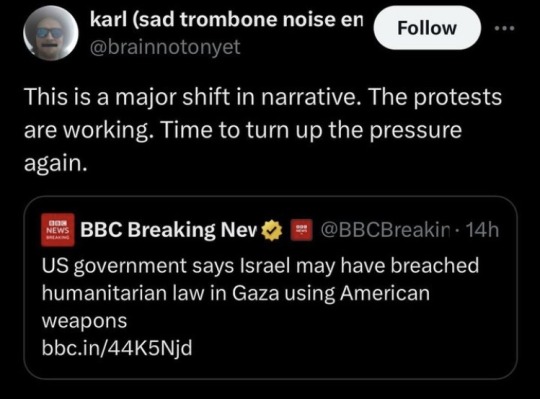
Continue Escalating
#social justice#current events#human rights#free palestine#gaza#free gaza#palestine#gaza strip#gaza genocide#save gaza#gazaunderattack#freepalastine🇵🇸#free palastine#from the river to the sea palestine will be free#stand with gaza#gazaunderfire#important#yemen#tel aviv#jerusalem#i stand with palestine#i stand with gaza#palestine 🇵🇸#news on gaza#solidarity with gaza#solidarity with palestine#palestine news#rafah#all eyes on rafah#keep eyes on rafah
45K notes
·
View notes
Text
Reindeer Games
With the whole family here for a length of time, we had the opportunity to interact with quite a few different activities, games, and outings. We’re all a little tired; the cousins have had free rein with video games and the rousing competition that happens when they all get together, we’ve been eating a lot of “unnecessary” foods, and bedtimes have been flexible. I feel for the parents as they…
#belonging#Bible#community#competition#Dayle Rogers#family#God#happiness#Jesus#joy#Professor Roy Baumeister#Reindeer Games#social standing#Tip of My Iceberg#togetherness#video games
0 notes
Text
happy father's day to palestinian fathers. happy father's to palestinian grandfathers. happy father's day to palestinian fathers who have lost children. happy father's day to palestinians who have lost their fathers. happy father's day to palestinian fathers older than israel itself. happy fathers day to palestinian fathers forgotten by the media. happy fathers day to fathers living in the gaza strip and west bank, and to fathers that have escaped palestine.
happy father's day to all palestinian fathers. you are not weak or any less of a man for struggling or showing emotion. you are some of the bravest men out there. 🇵🇸✊❤
#palestine#free palestine#gaza#free gaza#gaza strip#palestine news#gaza genocide#israel#palestine freedom#rafah#fathersday#father#fathers day#fathers day 2024#father's day#father's day 2024#fathers of palestine#happy father's day#genocide#fight genocide#palestine genocide#palestinian genocide#i stand with palestine#we stand with palestine#stand with palestine#all eyes on palestine#humanitarian crisis#human rights#social justice#from the river to the sea palestine will be free
16K notes
·
View notes
Text
He wondered what it was to have your future painted just so, to have your perfect world so closed. Maybe he already knew. Just in a different way.
Chris Whitaker, from All the Colors of the Dark
#social commentary#privilege#all planned out#closed off#elitist#trapped#socioeconomic#some are born to sweet delight#personal#doomed#fate#social standing#quotes#lit#words#excerpts#quote#literature#chris whitaker#all the colors of the dark
0 notes
Text
batfam meets the JL but it’s just the bat kids breaking into the watch tower during a debriefing or meeting to ask bruce the most mundane questions. they go about it like they’re interns that need to speak to the CEO during a board meeting. they walk over waving their hands and mouthing “i’m so sorry just need to ask batman something 😬” and then they lean over to bruce and ask something like “alfred wants to know if you’re gonna be home for dinner” and then they dip.
one of them started this when bruce didn’t answer their texts (it was probably tim or something) and now everyone does it.
#this or they stand at the distance preferably behind the person speaking and mouth shit at him like#‘what’s my social security number?’#‘can u pick up dog food on the way home?’#‘do u know where my birth certificate is?’#‘are we getting cass individual gifts or are we doing a family one?’#bruce pretends to find it annoying but he actually finds it kinda funny#dick grayson#jason todd#tim drake#bruce wayne#duke thomas#damian wayne#steph brown#cass cain#batfam#bat family#headcanon#rambles
10K notes
·
View notes
Text
Don't scroll. Just think.
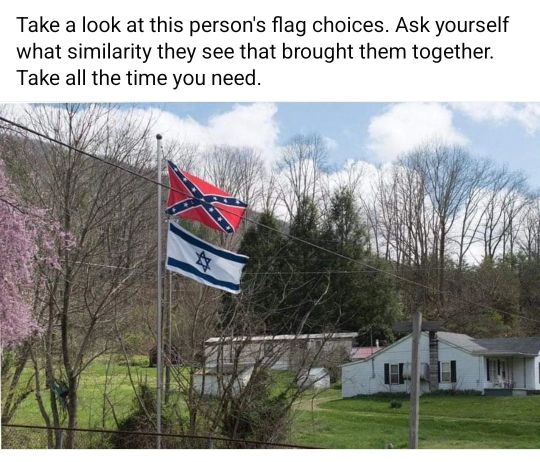
#important#human rights#social justice#humanity#palestine#free palestine#gaza#free gaza#from the river to the sea palestine will be free#i stand with palestine#rafah#save rafah#white supremecy
17K notes
·
View notes
Text
Being Above Average but of Average Social Standing
The Tao that can be trodden is not the enduring and unchanging Tao. The Tao-Path is not the All-Tao. The Name is not the Thing named. - Laozi, Tao Te Ching

I know I'm intelligent. I've never done an IQ test, because I believe it's just another unnecessary box people are placed into. But, growing up, I've been told by teachers and other intelligent people that I'm intelligent. I've always thought school was too easy, and was recommended into gifted programs. Everything from Math to English, I was either top of the class or close to the top. And I know I'm intelligent as well. I see it in the way I think and convey my thoughts.
Apart from academic excellence, I also have many talents. My parents were very adamant on making me a "cultured" individual. I was placed into various extracurricular classes ever since I was four or five years old. Dance, visual arts, and vocal lessons were the ones I enjoyed the most, and also the ones that came most naturally to me. I also love to read and write prose and poetry. I grew up performing, and honing these skills. I'm very self-critical (another quality of intelligence), so I would always try to improve. I believe in the capacity of any human being to be able to do what any other human being can do. Of course, there are certain limitations resulting from our genes, but we're still all human beings. If one tries hard enough, the limits are boundless.
I'm also quite good-looking. I've received many compliments, and I'm very confident in my appearance. I also dress well, work out, and take care of myself to maintain my appearance.
And to add on top of all of this, I'm not a boring prude either. I know how to have fun. I'm quite witty, and I love to be silly.
Now, I'm not saying all of this to boast. I'm not perfect, and I'm certainly not the best at everything. I can't play an instrument, sometimes it takes me a while to feel the beat of a song, I don't speak the most eloquently, and I certainly don't have model-like good looks. I'm aware of this. I see when other people are better in these ways. I always compliment people where they deserve to be. I was raised to be modest, humble, and to see the good in others. I'm just very well-rounded, and as a whole above average.
Why does this matter, and why am I speaking on all of this? Well, despite excelling in many ways, I come from a very humble family, finances wise. As a result, my opportunities in life were always limited. Another crutch to this reality is that I'm a first generation immigrant. My parents and I came to Canada in 2007, after I had just completed first grade in China. We came here with very little money, and my parents had to restart their lives. They worked lower middle class or working class jobs to make ends meet. Our connections were limited to people in these sectors of society as well. The focus was always on making more money and climbing up the social ladder. This is why going to a good university, getting a good degree, a good job, and making a lot of money is so important to us. However, it created many problems for my up-bringing.
My family was dysfunctional, the pressure was on me to dig us out of a hole I wasn't a part of digging, and I had very few friends. I had nothing material to show for my excellence. I'm also a female, with quite the baby face. People like to judge. Humans are superficial. And we create expectations of others in our minds out of these incorrect prejudices. When people first look at me, they more often than not think I'll be a weak, demure, and simple girl. They won't expect me to have all the abilities I hold. Whenever there's a disconnect between a person's expectations and realities, discomfort arises. It triggers a fight or flight response, because there's a sense of unfamiliarity and fear. The disconnect I cause in people's minds is probably quite great. People either love me or hate me because of it. All of this meant I had very little support from the people I most wanted support from - my family and my peers. I was intimidating to most people my age, and my family had very little time or money to spare me.
As a result, I've always felt pressured to prove myself. There has always been such a great weight on my shoulders to do anything that would show people just how great I am, and what I can achieve beyond people's expectations of me. Eventually, I became drained. It's not easy when I'm able to see past what's in front of me and onto the bigger picture. I'm constantly helping others, when I lack the most support. I won't lie, some of this I did create for myself, because people just don't stimulate my brain enough, or aren't able to match up to me, and I don't feel comfortable asking those I consider "weaker" than me for help.
At the age of 18, I began losing my mind to it all. I had very little friends - if any I considered close, I wasn't doing what I wanted, and I became depressed. I had just gotten into university, but it quickly dawned on me that this wasn't what I wanted at all. I was doing all of this in search of something that was in actuality meaningless to me. I don't care about money or status. All I want is to live a simple life, and let the days pass me by stress-free. I transferred out of several university programs, dropped out completely, and went to college instead. It made me feel incredibly insecure. Now I had absolutely nothing to show for who I am on the inside. I was back at square one. It felt like my life was starting over. This feeling only brought me down more. I felt like a failure, and I began to lose my way.
Today, I'm settling back into who I am. I don't have to prove anything to anyone. The future seems incredibly uncertain, but there's one thing I'm incredibly certain of - who I am and my value. I'm incredibly valuable. It sucks that most people just won't ever see that. But, I have accepted it for what it is. Society is made for the average person, and those who are on par with me will see me for all that I am. I just have to continue to be my best self, and hope for a future where I'm not taken for granted. Results are what matter, not the journey.
If you are average, I'm telling you to be grateful for being average. It's the luckiest thing a person can be in this society. However, I won't ever dumb myself down to fit in. The results will be shown in my satisfaction with life, and self-actualization (a little Maslow's Hierarchy of Needs reference to end this off).
Best to everyone.
Love, Chenchen ♡
#spirituality#being average#being human#being above average#intelligence#talent#taosim#connectedness#philosophy#life#wellness#maslow's hierarchy of needs#psychology#trauma#childhood trauma#the immigrant experience#first generation#chinese canadian#chinese#social status#social standing
1 note
·
View note
Text
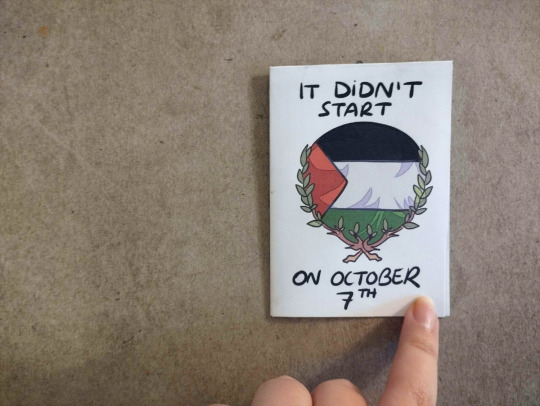


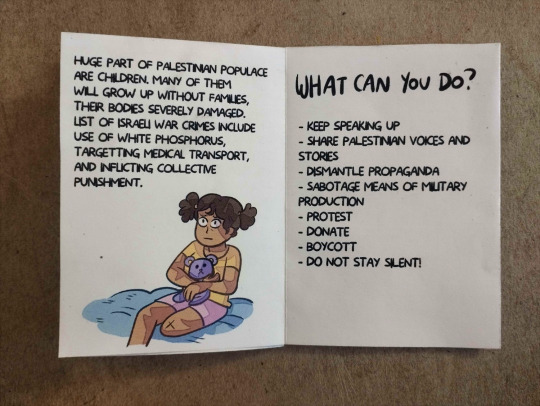


hey! for todays protest, i made this little zine about palestine (holding just simple and basic information).
you can download the zine here, fold it yourself, and distribute it around.
no credit is needed. feel free to leave it around bars, protests, or wherever. simply print it (borderless) and fold it. here is a tutorial on how to do it.
dont stay silent. there is a genocide of horrendous, atrocious proportions going on. also if you are a zionist here to argue with me, i dont plan to entertain you at all, not on my art blog. fuck off, you'll be swiftly blocked. i see enough of you clowns on my main and i have no energy for you. you can skip the death threats too bc i dont give a shit.
(i'm off to get ready for a surgery now, i just wanted to post it before this. if you need anything, i might take a bit to reply)
#free palestine#from the river to the sea palestine will be free#anti zionisim#israel is a terrorist state#israel is an apartheid state#palestine resources#gaza#palestine#art#comics art#art zine#p.s. i usually put my socials on the end of my zines#i didnt do it here not bc i dont stand behind my words#but bc im not interested in self-promotion over palestinian dead bodies!#srsly you dont have to credit me i just hope this zine gets distributed#and as always do *not* sell this.#its a free resource based in what ive learnt from palestinians themselves#its not made for monetary or followers gain
18K notes
·
View notes
Text
I am not Palestinian, I am Indigenous American.
One hundred and forty six years ago my people were forced to move to Oklahoma, this event was known as the Ponca Trail of Tears. The land my people were forcibly moved to didn't have any proper shelter or food, so my people both froze and starved to the point we are a fraction of what we once were.
The government and schools don't talk about what America has done to my people, I only know because of my great-grandfather and his sister.
The American Government tried to take our identity away, our language is dying out. All because my people weren't living the same lifestyle the land stealers were living.
I stand with Palestine because I see Israel doing what America did to my people and the many Indigenous tribes. I know what it is like to have your identity and culture oppressed and to be dehumanized, and I refuse to let history repeat itself. I will continue to stand with Palestine even when I no longer walk the Earth.
#social justice#indigenous american#indigenous#i stand with palestine 🇵🇸#palestine#israel is committing genocide#israel is an apartheid state#from the river to the sea 🇵🇸#from river to sea palestine will be free#from the river to the sea palestine will be free#i stand with palestine#i stand with gaza#free gaza#save gaza#gaza#save palestine#indigenous supporting palestine
20K notes
·
View notes
Text
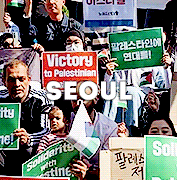














THE WORLD STANDS WITH PALESTINE 🇵🇸
#FREE PALESTINE#!!!!!!#its been over 70 years#and the world is finally waking up#better late than never#proud of everyone for speaking up!! protesting!! sharing on social media!!#proud of people who wont stand for genocide and apartheid#palestine#pro palestine#politics#mine*#gifs*
16K notes
·
View notes
Text
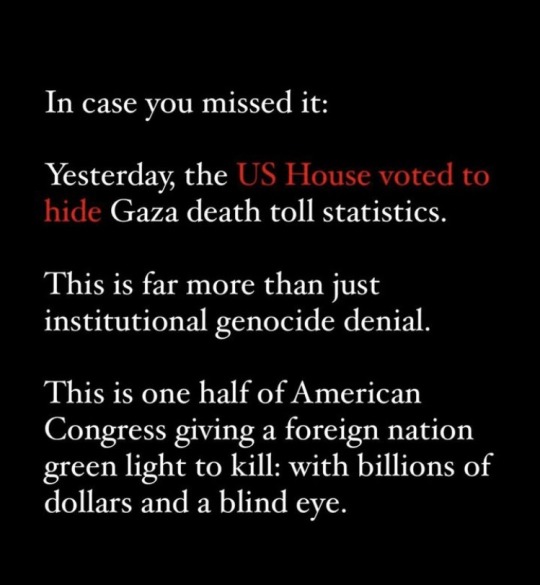
This measure, if passed in Senate, would make it illegal for the US State Department to cite genocide statistics.
In other words, illegal to do its job.
#social justice#current events#human rights#free palestine#gaza#free gaza#palestine#gaza strip#gaza genocide#gazaunderattack#save gaza#gazaunderfire#stand with gaza#from the river to the sea palestine will be free#free palastine#freepalastine🇵🇸#important#us politics#american politics#united states politics#usa politics#palestine 🇵🇸#news on gaza#palestine news
19K notes
·
View notes
Text
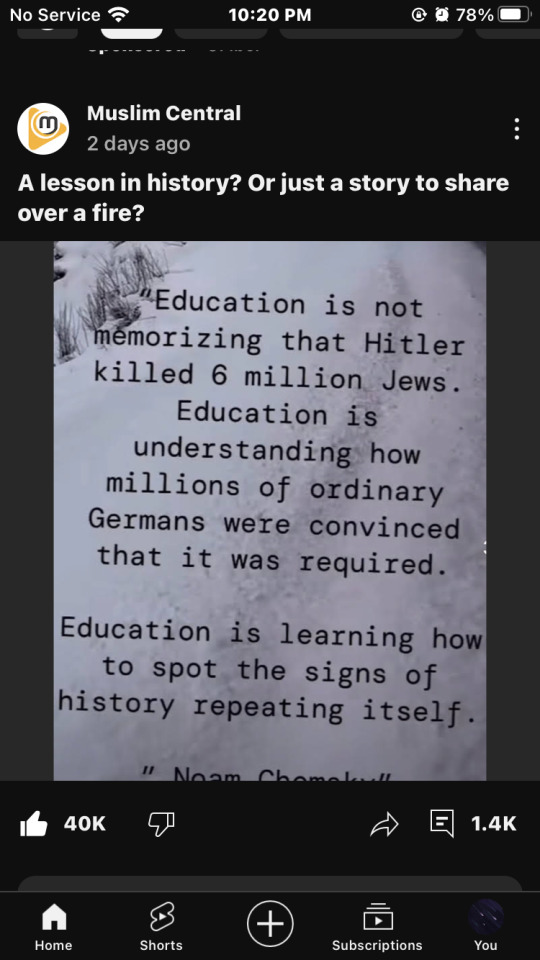
#apartheid#ceasefire now#end the occupation#free palestine#humanitarian crisis#i stand with palestine#israel is an apartheid state#israeli war crimes#stop the genocide#colonialism#human rights#Palestine#social justice#humanitarian aid#israel
7K notes
·
View notes
Text
Traits I’ve Noticed in Confident People
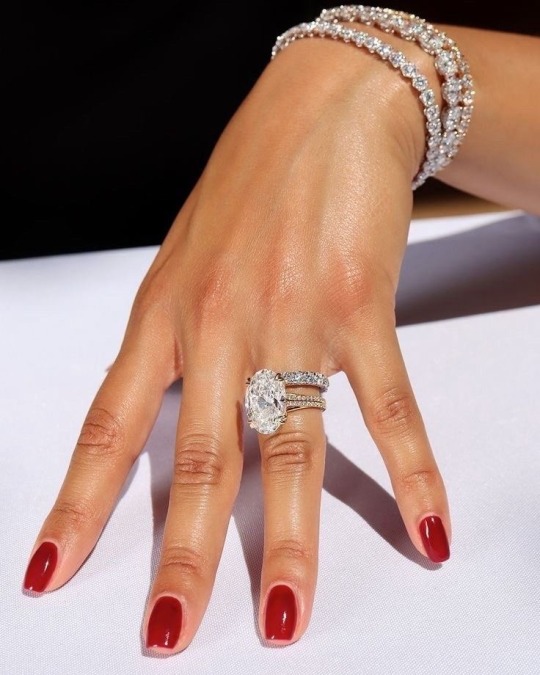

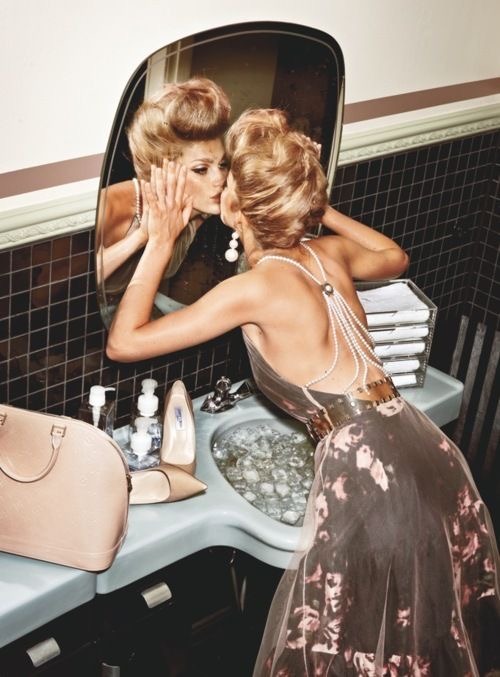

Disciplined - if a target is set, it is achieved
Speaking - Can speak multiple languages. Can express thoughts clearly even if vocabulary is limited. The listener understands their point.
Strong extroversion socially - can approach and talk to new people with ease, but also make them feel comfortable. Good at following up, asking questions and inserting little stories about themselves without exposing too much
Strong general knowledge / industry knowledge. They know what they’re talking about
Hard to please but not arrogant about it. They won’t readily accept a fact or opinion, even if the majority agrees - they’ll debate with it, think over it, play the devil’s advocate
Good posture
Strong set of principles and self control. There’s no shame in wanting to say, help someone, choose not to drink socially, buy a coffee for a poor person on the street; they don’t hesitate to do good deeds
Hygienic. Clean, groomed, well dressed, well maintained.
Observant and proactive at the same time. Can pick up on body language relatively easily - can sense discomfort or unease in someone and do something about it.
Have a strong sense of self identity. Can be opinionated but open to challenges.
#c suite#powerful woman#strong women#ceo aesthetic#personal growth#that girl#productivity#getting your life together#balance#Confidence#confident traits#how to be confident#How to be yourself#being social#socialising#stand out#glow up
10K notes
·
View notes
Text
I want to tell you more about me and why this campaign has taken a toll on my mental and physical health. I'm sure you understand me if you also suffer from social anxiety. I am living through introvert hell and I just want it to stop.




My exhaustion can't be described with words. Every day I wish I had died when this all started. Everything exhausts me. Please help, please. I'm constantly annoyed with my family because we've been packed in the same room for months while we're all on edge, but they're still my family. I can't let them die. I can't let my younger siblings and my grandmother down.
My campaign is now vetted! So please don't hesitate to help me anymore.
✅️Vetted by @gazavetters, my number verified on the list is ( #347 )✅️
Please forgive me for tagging all of you again, but it seems that this is the only way I can be heard... @timetravellingkitty @deathlonging @briarhips @mahoushojoe @sar-soor @rhubarbspring @schoolhater98 @pcktknife @sawasawako @appsa @anneemay @commissions4aid-international @wellwaterhysteria @mangocheesecakes @kyra45-helping-others @7bittersweet @tortiefrancis @ot3 @amygdalae @ankle-beez @communistchameleon @dykesbat @komsomolka @neptunerings @riding-with-the-wild-hunt @heritageposts @watermotif @stuckinapril @mavigator @lacecap @determinate-negation @deepspaceboytoy @paper-mario-wiki @kibumkim @neechees @socalgal @chilewithcarnage @ghelgheli @sapphic-dino @rooh-afza @shesnake
#mental health#mental illness#actually mentally ill#social anxiety#social phobia#bullying#introvert#free gaza#gaza#gaza strip#all eyes on palestine#free palestine#gaza genocide#gazaunderattack#i stand with palestine#gofundme#mutual aid#signal boost#please boost#vetted#please help#from the river to the sea palestine will be free#original comic#original art#artists on tumblr#digital art#artwork#comic art#art
3K notes
·
View notes
Text


hi hello this is your reminder that google are hypocrites(and bds)
the lay offs were on the 18th this month, pretending to celebrate a native culture as you help the military that is actively ethnically cleansing them, and has been for years, is highly hypocritical and just an attempt to save face
in case someone forgot, google is on BDS' "pressure" list, which means it isn't necessary a 100% boycott but rather a target for pressuring and limiting your use of their services to push them towards cutting ties with israel
additional context on dabka:
it is a folk dance from levantine countries like lebanon, jordan, syria, and palestine. with possible origins in ancient phoenician and/or canaanite cultures
#3 of the countries mentioned in the dabka part were bombed by israel in the past 6 months btw#also yeah youtube is owned by google... just incase someone somehow didn't already know-#israel#colombia university#jerusalem#free gaza#gaza#free palestine#palestine news#united nations#palestine#gaza strip#social justice#yemen#colonialism#tel aviv#news on gaza#west bank#apartheid#فلسطين#i stand with palestine#lebanon#jordan#syria#fuck google#google
3K notes
·
View notes